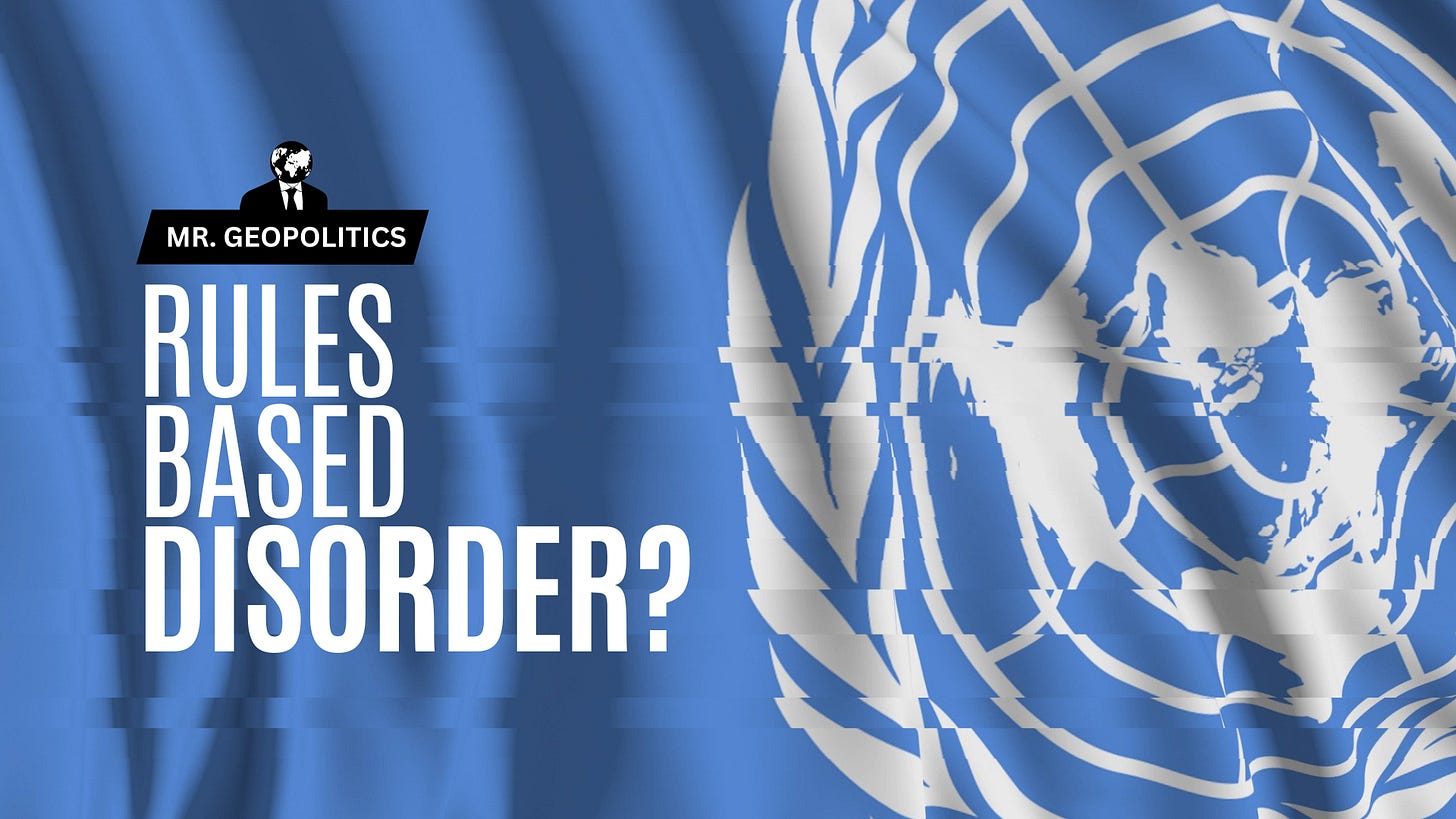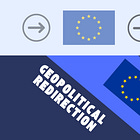Future of the United Nations
If the UN is lame duck, what happens next?
At the United Nations, US President Donald Trump lambasted the United Nations (UN), questioning its purpose as America attempts to solve global conflicts unilaterally, and even linking challenges like huge waves of immigration into the West with the UN’s mandate.
It was a stunning moment—to put it mildly. The country that built the UN decades ago was now debating its relevance and challenging its raison d’être. But, Trump’s speech may have been far more than public criticism of one of the world’s oldest institutions. It may have been a formal warning that America is on the verge of quitting the UN—like it has quit the WHO—depending on what happens next.
👁 GEOPOLITICAL FORESIGHT ON GLOBAL RULES
Trump is not the only leader to cast doubt on the UN. Over the years, several others have done the same, including:
Earlier this year, on a podcast, Indian Prime Minister Narendra Modi cast the UN as an institution that was failing to fulfill its role.
In 2019, Turkish President Recep Erdogan famously said, “the world is bigger than five,” calling out the UN Security Council and its inability to expand to include new members.
Brazil, which is hosting COP30 this year, has called for the creation of a new forum to manage trade and climate matters as nations grow uncomfortable managing certain challenges within COP (UN).
But what President Trump did, calling out the UN within the institution’s chambers for the entire world to see, has never been done before. For the UN, it should ring alarm bells. Some of the most powerful countries around the globe are moving towards unplugging and disconnecting from the post-World War II architecture. And what begins with the UN could expand far beyond it.
Will America Leave?
The future of America’s membership in the UN depends on what happens next in the world. This is a new link between geopolitics and America’s continued inclusion in a global institution.
There are two big “events” that could cause the US under Trump to withdraw:
First, the Ukraine war turns into a stain on Trump’s legacy. Already, Trump has done a 180, from criticizing Ukraine to siding with Ukraine and criticizing Russia and Vladimir Putin. However, this may be more “emotional outburst” (over Putin’s reluctance to meet Trump’s demands) than a long-term American strategy. In reality, if the Ukraine conflict does not end and requires a tremendous amount of American resources or even expands into something bigger (e.g., Poland shoots down Russian jets), sidelining Trump’s America First vision, the UN could be in the crosshairs. Inability to end the Ukraine war could coincide with America leaving the UN.
Second, if a major black-swan event takes place, from a Chinese invasion of Taiwan to a crippling global cyber attack, once again the US could take out its anger on the UN, accusing it of failing to uphold global security and order. The US may leave as it deals with the black-swan event, either on its own or through very exclusive settings. This means, what happens next in the world of geopolitics, like another power keg exploding, could define the future of the UN and whether it remains fragile but together or begins to fall apart.
Should America leave, the UN itself would be pushed into an unprecedented limbo. The biggest would be funding, as America contributes 22% of the UN’s overall budget (around $18-$20 billion). If this suddenly disappears, it will fall on others to pay up or for the UN to roll back its footprint. This latter part is more than serious. From dealing with famine to managing disease outbreaks to advancing the UN’s Millennium Goals, without funding, millions of lives could be threatened. This also includes UN efforts around peacekeeping, which is a separate funding track (and where America is also the biggest contributor).
Alongside funding concerns, there is a big question mark on whether others, like Japan, the United Kingdom, or Arab capitals, may follow America and also withdraw from the UN. And at the same time, a fresh geopolitical competition could begin over who should call the shots if America leaves.
This last part is particularly important. The UN is the main organ to deploy global rules, like for telecommunications. There has already been immense jockeying, specifically between the US and China, to set the new technology standards. Should America exit the UN, China will be able to control the global technology rules without limits. But, an American exit also pours water on how “global” the UN’s mandate can actually be (i.e., the US having its own technology rules, not adopting the UN’s).
Ricochet Effect
Even without America leaving the UN, Trump’s speech makes it clear: the rules-based order is shaking faster than ever before. The institutions that underpin it are finding themselves as observers on battlefields they once controlled. What begins as criticism of the UN could quickly turn into the US criticizing a bulk of the world’s institutions, including the WTO (World Trade Organization), BIS (Bank of International Settlements), and OECD (Organisation for Economic Co-operation and Development), to name a few.
Consider that America is already threatening to sanction other global bodies, like the ICC, and Trump is skipping the upcoming G20 Summit in South Africa, weakening America’s commitment to the global gathering (unless it is held in the US, like it will be next year).
If global bodies are under siege by the US—and others—then the world is truly in a perilous moment. It is a strange paradox. Geopolitical fires are making nations question the global institutions. Yet, it is these same global institutions that may be the only vehicles to put out the geopolitical fires.
The world’s institutions, and the world that relies on them, must prepare for an era of disorder and no rules. The global economy cannot rely on the WTO to guard trade and commerce; societies cannot depend on the WHO to protect against disease and virus; flashpoints cannot look to the UN to mediate differences and end hostilities through diplomatic means.
Put differently, Trump’s speech at the UN has revealed a new truth: for the next little while, governments and businesses are on their own in navigating the geopolitical complexities, as institutions struggle to lead.
Post-Global Institutions
While the era of global institutions is in the air, the era of institutions is not over—it will simply take on a different form. Earlier this year, Germany and the EU proposed a new European alternative to the WTO. Once again, it is not just the US criticizing the global groups—other major economies are too. This new setup, where Europe could have a trade forum separate from much of the world, is exactly the kind of fracturing that is likely to multiply in the coming years.
In the case of the UN, instead of a single UN, there may be regional UNs—with different names or membership rosters. These do not necessarily have to be new institutions. Recently, after Israel’s strike on Doha, the Gulf Cooperation Council (GCC) convened in an unprecedented way, even activating its collective defense arm and warning that an attack on Qatar was akin to an attack on the entire group. In the blink of an eye, the GCC has gone from being “just another” forum to being the main way Arab states deal with regional hostilities. And, again, the UN is observing what it once managed.
Whether it is GCC in the Middle East, SAARC in South Asia, or ASEAN in Southeast Asia, old and new groups could begin to manage regional affairs—diplomacy, trade, climate, etc. In such an environment, organizations like the UN will struggle to find their voice and footing.
Equally important is that in the post-global institutions era, groups that were once clearly defined could have a new purpose. For example, the US condition that NATO states must stop buying Russian oil before America sanctions Russia converts NATO from being a defensive bloc to being a geoeconomic group. NATO is now setting the energy matrix of Europe—moving it well beyond defense and security.
Technically, trade (energy) is the purview of the WTO, and sanctions are the purview of individual states or governments. But in the case of West vs. Russia, NATO is being given the responsibility to manage both.
Conclusion
In today’s geopolitics, many global stakeholders are no longer shocked by surprises or disruptions. Not that these events do not shock. But rather, the fact that they take place is not shocking. What has occurred at the UN is an example of this. In Trump’s signature style, an event that was supposed to bring together the world was instead turned on its head. And with UN senior leadership sitting behind him, the President of the United States has challenged the UN to prove its relevance.
That is the biggest takeaway from what has occurred at the latest United Nations General Assembly (UNGA). The task is now on the UN to define why it still matters and who it is leading, if not the major powers. Other institutions, watching the UN, should start thinking similarly.
With all kinds of geopolitical surprises and curveballs about to strike, some of which are captured in the quarterly and monthly executive briefings, the UN’s future could be determined sooner rather than later.
Just as the timeline is shrinking in flashpoints (i.e., the US-China fight is taking place over weeks, not decades), so too, the timeline is shrinking in longevity (i.e., the future of the UN, WTO, etc).
But the biggest question, and one that should give many pause in their tracks, is what happens to the world if the UN no longer exists. Does it become a safer place as nations manage differences in more intimate forums? Or does the world fall into even more instability and uncertainty?
-ABISHUR PRAKASH AKA. MR. GEOPOLITICS
Mr. Geopolitics is the property of Abishur Prakash/The Geopolitical Business, Inc., and is protected under Canadian Copyright Law. This includes, but is not limited to: ideas, perspectives, expressions, concepts, etc. Any use of the insights, including sharing or interpretation, partly or wholly, requires explicit written permission.
Have questions or thoughts? Let’s talk: mrgeopolitics@substack.com
If you like Mr. Geopolitics, your colleagues might too.
Feel like doing something unique for somebody important?









